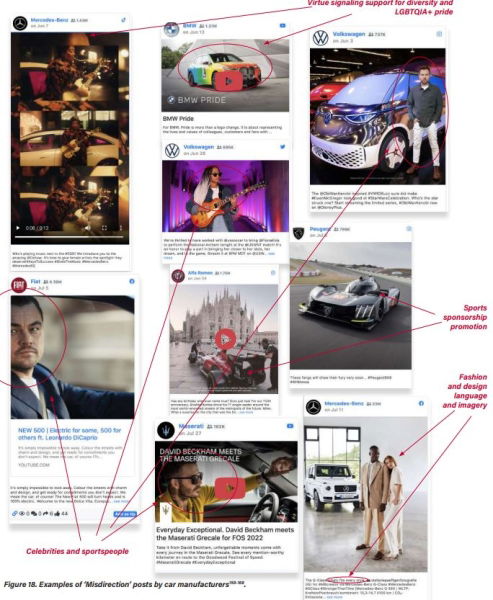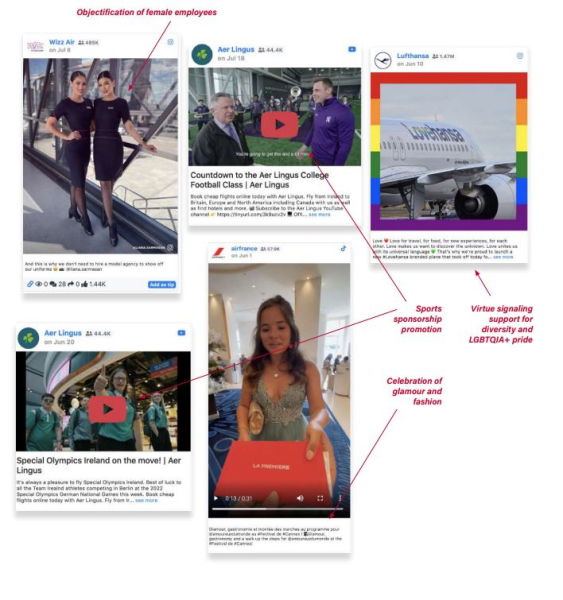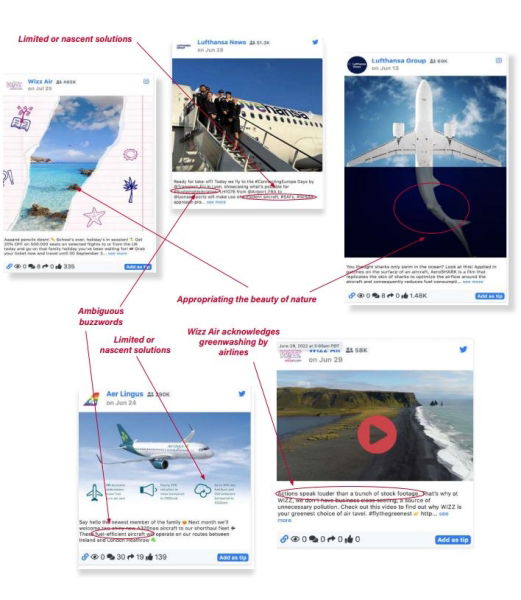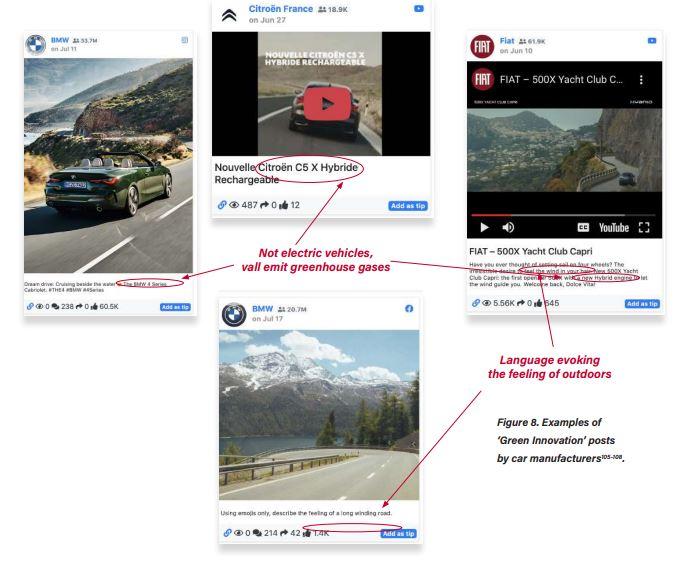



Greenpeace: Social media the new battle ground for climate disinformation by brands
share on
Social media appears to be the new frontier of climate disinformation and deception as two-thirds of oil and gas (72%), auto (60%), and airline (60%) companies use social media to paint a “green innovation” narrative on their businesses. According to a study done by Greenpeace for the European market, this ratio of ‘green-to-dirty’ in each industry’s public communications misrepresents companies’ commitments to decarbonisation.
Moreover, approximately one-in-five oil and gas (23%), auto (22%), and airline (15%) company posts feature sports, social causes, or fashion. Calling it a "misdirection", the study says this is to focus the audience’s attention on engaging topics unrelated to companies’ core business operations. This can variously legitimise fossil fuel interests’ social license to operate, distract attention away from firms’ core business responsibilities and contributions to the climate crisis; and market brands as exclusive, desirable, and relevant, said the report.
“We interpret greenwashing by the fossil fuel industry to be most blatant, whereas that by airlines is notably subtle,” said the study. Statistical analysis also found that fossil fuel interests’ systematic use of nature-evoking imagery to enhance the ‘greenness’ of their brand image on social media.
Moreover, companies (particularly car manufacturers) leverage not just the imagery of nature, but also of female-presenting people, non-binary-presenting people, non-caucasian-presenting people, young people, experts, sportspeople, and celebrities to reinforce their messages of “green innovation” and/or “misdirection”.
The study ads that while in the past companies “abetted by public relations firms have collectively waged a multi-decade, multi-billion dollar campaign of lobbying, disinformation, and propaganda” to confuse the public, and “undermine climate and clean energy”, over time, their tactics and rhetoric have evolved and gone digital. There has been a move from” outright, blatant climate denial in newspapers and on television to “more subtle talking points” on social media and in native advertising on news websites.
As part of the study, between 1 June and 31 July 2022, Greenpeace collected 33,969 organic social media posts from 22 EU-based companies with fossil fuel interests, by way of 375 social media accounts across five platforms (Facebook, Instagram, TikTok, Twitter, and YouTube).
For each social media account a combination of methods were used to extract each social media post, including text, image and video files, and social media engagement data. Data from Facebook and Instagram was collected using Meta’s social listening tool CrowdTangle. Data from Twitter was collected using a combination of Twitter’s public API and the PushShift Twitter API. Data from YouTube was collected using the YouTube public API, and data from TikTok was directly scraped from the platform and leveraged the use of a third-party data API.
The posts analysed in this report were organic content as advertisements are considered paid promotions, whereby an advertiser can target audiences based on demographics and other criteria, and are subject to stricter content rules and disclosure requirements.
“However, the distinction between advertisements and organic content can be misleading,” said the report. “All corporate communications content published on social media is, by definition, paid for by the company in question, regardless of whether the company paid the platform to promote it. In addition, a key objective of some social media advertising is to build a following, so that future organic posts reach audiences without additional paid promotion.”
Specific instances of misrepresentation
The report said that car companies’ messages of “misdirection” are generally more squarely centered around sports (63%), and motor racing in particular (56%), yet 29% of ‘misdirection’ posts also concern fashion and design. Airlines’ ‘misdirection’ messaging is dominated by discourses of fashion and design (54%), LGBTQIA+ issues (22%), and sports (14%).


Meanwhile there are also different levels of diversity of “green innovation” messaging between the three industries. Airlines “green” their image primarily with nature/environment visuals. They also discuss their plans/initiatives (8%) and low-emission aircraft (9%). Car manufacturers do the same with 64% of their ‘green innovation’ posts show nature/environment visuals, but in similar measure also communicate about sustainable transport (60%), primarily by highlighting Electric Vehicle products (36%) and vehicle Emissions data (32%) and by making efficiency language claims (7%).


Fossil fuel producers have a broader spread of ‘green’ discourses than the other industries, the most common textual discourses being plans/initiatives (42% of ‘green innovation’ posts). The most common imagery contains clean energy solutions (42%), nature/environment (56%), and innovation/ laboratories/scientific iconography (10%/7%/9%, respectively).

Most recently, sustainability review platform Wherefrom called out a slew of ads by Mercedes-Benz meant to promote Mercedes-EQ, its line of electric cars. Wherefrom's called out the automotive maker for greenwashing after Mercedes-Benz associated its brand with the beauty of nature in its ads. The original ads showed images of nature from a rose to the veins of leaves, a honeycomb, and lightning. A circle is placed in the middle of the ads to showcase the Mercedes-Benz symbol.
Mercedes-Benz later clarified its series of ads that garnered chatter for greenwashing was not a global brand campaign. Instead, the images were localised social media content by Mercedes-Benz Mexico for Earth Day in April this year.
Meet Asia’s top PR and communication leaders in-person. PR Asia sets the stage for the future of purpose-driven contemporary PR. Join us on 9 November as we gather Asia’s top PR and communication practitioners in-person in Malaysia. Deep dive into the next necessary steps for PR as we head towards 2023. Only at #PRAsia.
Related articles:
Mercedes-Benz called out by sustainability review platform for greenwashing
H&M and Decathlon Netherlands promise to adjust sustainability claims on products
Interview: How The Body Shop stays accountable in its push for sustainability
share on
Free newsletter
Get the daily lowdown on Asia's top marketing stories.
We break down the big and messy topics of the day so you're updated on the most important developments in Asia's marketing development – for free.
subscribe now open in new window
